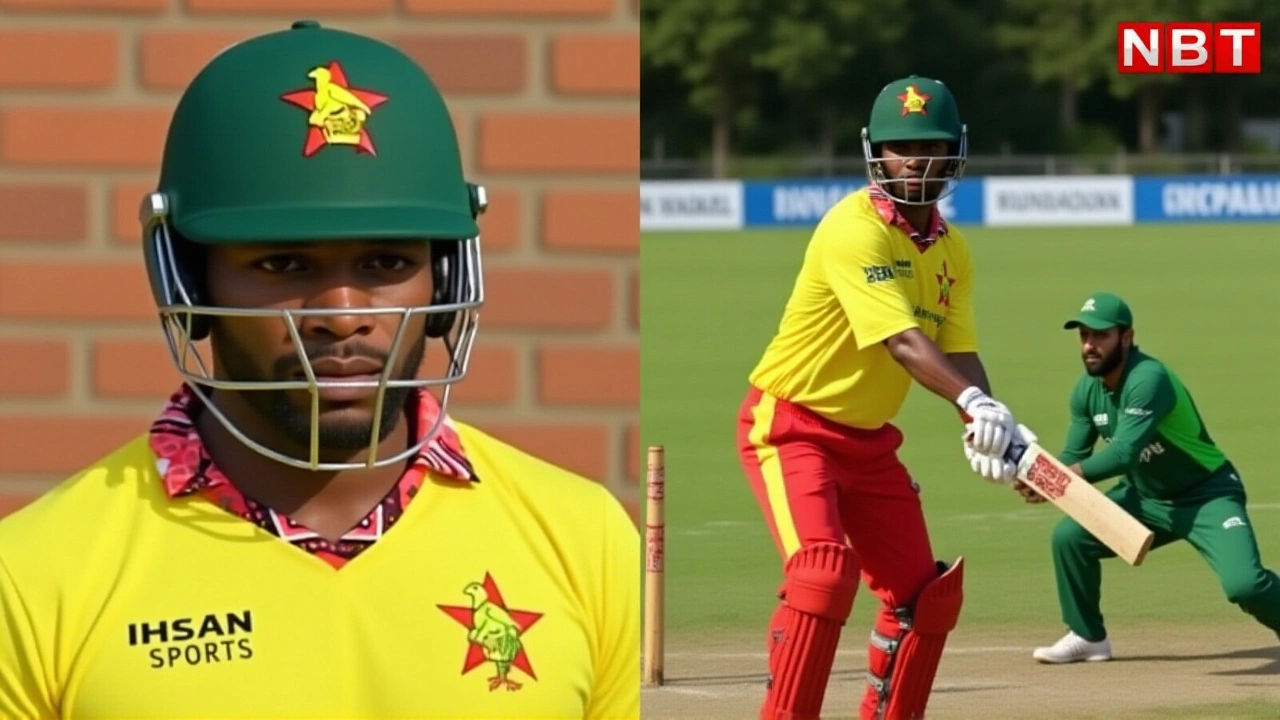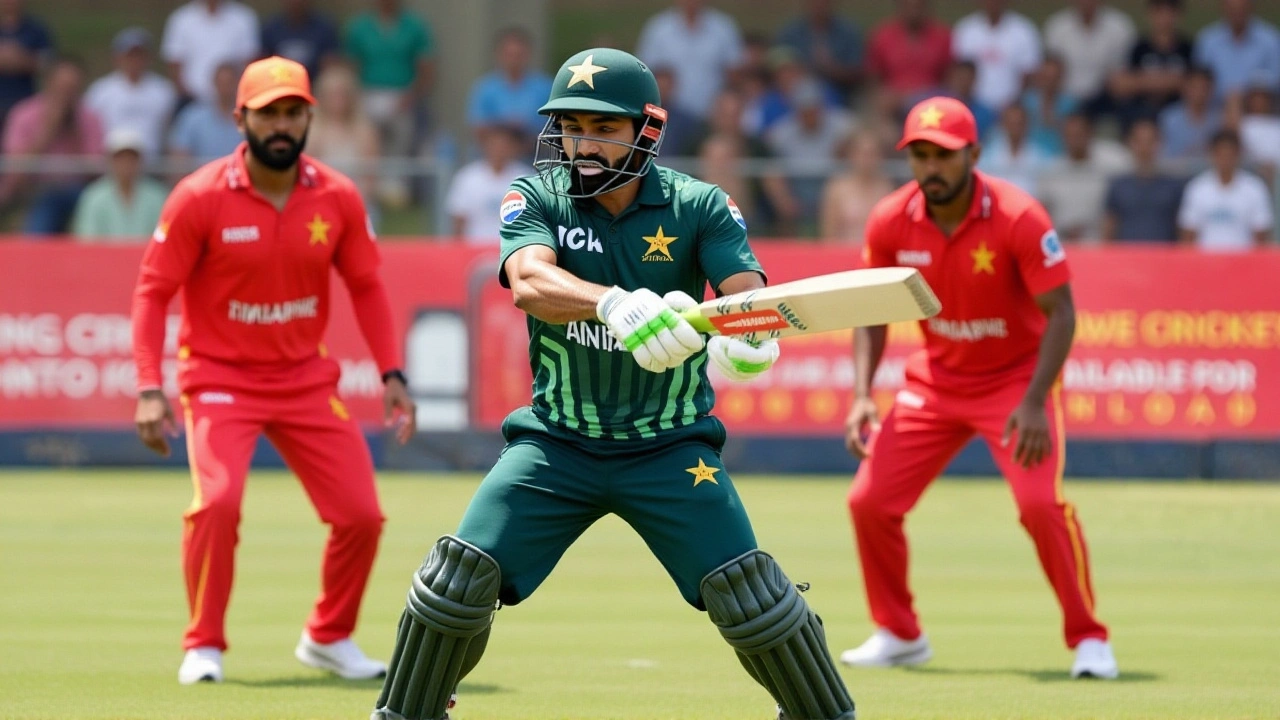Zimbabwe Stuns Sri Lanka with Record 67-Run Win in Rawalpindi T20 Match
 Nov, 24 2025
Nov, 24 2025
When Zimbabwe Cricket took the field against Sri Lanka Cricket on the Pakistan T20 Tri-Series 2025Rawalpindi Cricket Stadium, no one expected history to be made. But by the end of the night, Zimbabwe had crushed Sri Lanka by 67 runs — their biggest ever T20I victory over a full-member nation — turning a predictable match into a seismic upset. The scorecard read 1/1 early on for Sri Lanka. Then, the collapse began. And it didn’t stop.
A Collapse That Shook the Cricket World
Sri Lanka, fresh off a clean sweep in the ODI series, entered this T20I as heavy favorites. Their batting lineup boasted world-class finishers. Their bowling attack had the experience to choke any chase. But everything unraveled in the first six overs. Pathum Nissanka was bowled by Richard Ngarava on the very first ball. Then, Kusal Perera — Sri Lanka’s veteran opener — was caught behind off Tinotenda Maposa for just six. By the seventh over, Sri Lanka was 25/3. The innings never recovered.What followed was a bowling masterclass. Brad Evans returned figures of 3/9 in four overs — the most economical spell of the tournament. Richard Ngarava added two more wickets, while Sikandar Raza, Graeme Cremer, and Ryan Burl chipped in with one each. Sri Lanka’s innings ended at 95 all out in 20 overs — their lowest T20I total against Zimbabwe and the second-lowest in the tournament’s history.
Zimbabwe’s Batting Brilliance
Before the collapse, Zimbabwe had laid a solid foundation. Chasing 96, they didn’t need fireworks — just composure. And they delivered. Sikandar Raza, the captain, anchored the innings with a blistering 47 off 32 balls — four boundaries, two sixes, and a calm head under pressure. He shared a crucial 61-run third-wicket stand with Brian Bennett, who smashed 49 off 46, including three fours and two massive sixes. Even the tail contributed: Ryan Burl added 18 off just 11 balls, taking the score past 150 and ensuring Zimbabwe never lost momentum.It wasn’t about power-hitting. It was about precision. Zimbabwe lost only eight wickets, and their strike rate (81) reflected control, not panic. The fielding was sharp — no dropped catches, no misfields. Even the extras were minimal: just 12. This wasn’t luck. This was execution.

A Historic Win, A New Narrative
This was more than a win. It was a statement. Zimbabwe’s previous best against Sri Lanka in T20Is? A 43-run win in 2017. This one? 67 runs. It’s now their largest margin of victory against any full-member country — ever. And it came against a team that won the T20 World Cup in 2009, and had just swept a three-match ODI series.“We weren’t supposed to be here,” Raza said after the match. “But we believed. And when you believe, even the impossible looks possible.” He was named Player of the Match — not just for his 47, but for his leadership. He took a wicket too. And when the final ball was bowled, Zimbabwe’s players didn’t celebrate wildly. They just looked at each other. Like they knew they’d changed something.
For Sri Lanka, the defeat is a red flag. Their top order crumbled. Their middle order couldn’t recover. Their spinners — once their strength — were hit for 7.5 runs per over. The pressure of being favorites got to them. And now, they face a must-win final against Pakistan with their World Cup preparations in disarray.
What This Means for the T20 World Cup 2026
This match didn’t just change the standings — it changed perceptions. For years, cricket’s hierarchy treated teams like Zimbabwe as underdogs. But this win proves the gap is narrowing. Fast. In the last 18 months, Zimbabwe has beaten Bangladesh, drawn with Pakistan, and now crushed Sri Lanka. Their young players — like Burl, Maposa, and Evans — are no longer prospects. They’re match-winners.What’s more, this was played in Rawalpindi — a venue known for high-scoring games. Yet Zimbabwe won with a low total. That’s the new reality: T20 cricket is no longer about who has the biggest hitters. It’s about who handles pressure best. And right now, Zimbabwe is doing it better than most.

Where Things Go From Here
With this win, Zimbabwe moves to 1-1 in the tri-series. They face Pakistan next — a tough challenge, but now with belief. Sri Lanka, on 0-2, must win their final game just to stay alive. And if they lose? The implications go beyond the tournament. Cricket boards are watching. Funding decisions. Selection panels. Coaching changes. All of it could shift because of one night in Rawalpindi.For Zimbabwe, this is a turning point. Not just in results — but in identity. They’re no longer just a team trying to survive. They’re a team capable of dominating. And the world is starting to notice.
Frequently Asked Questions
What was the significance of Zimbabwe’s 67-run win over Sri Lanka?
It’s Zimbabwe’s largest-ever victory over a full-member nation in T20I cricket — surpassing their previous best of 43 runs in 2017. It’s also the biggest win by any associate team against Sri Lanka in T20Is, signaling a major shift in global cricket dynamics as smaller nations close the gap with traditional powerhouses.
Who was named Player of the Match and why?
Sikandar Raza was named Player of the Match for his all-round performance: 47 runs off 32 balls (including 3 fours and 2 sixes) and a crucial wicket. His leadership under pressure, combined with his ability to anchor the innings and accelerate when needed, made him the decisive factor in Zimbabwe’s historic win.
How did Sri Lanka’s batting collapse so quickly after starting at 1/1?
Sri Lanka lost their top three batsmen — Nissanka, Perera, and Mendis — within the first seven overs. Zimbabwe’s bowlers, especially Brad Evans and Richard Ngarava, exploited early swing and tight lines. The middle order, lacking experience in high-pressure chases, couldn’t rebuild. The total of 95 all out was their lowest against Zimbabwe and the second-lowest in the tournament.
What does this result mean for Zimbabwe’s chances in the T20 World Cup 2026?
This win proves Zimbabwe can compete with top-tier teams under pressure. Their emerging talent — Evans, Burl, Maposa — now have proven experience against elite opposition. If they maintain this form, they’re no longer just qualifiers. They’re potential spoilers. Their confidence, tactical discipline, and depth in bowling could make them dangerous in the group stage.
How does this compare to Zimbabwe’s past performances against Sri Lanka?
Before this match, Zimbabwe had won just two of their 12 T20I meetings with Sri Lanka, and never by more than 43 runs. This 67-run victory is their first win over Sri Lanka by more than 50 runs and the first time they’ve bowled them out for under 100 in T20I history. It’s a complete reversal of fortune.
Was this match affected by pitch or weather conditions?
No. The match was played at Rawalpindi Cricket Stadium under clear skies with no interruptions. The pitch offered some early swing and consistent bounce — ideal for disciplined bowling. But the result wasn’t down to conditions. It was down to Zimbabwe’s execution and Sri Lanka’s inability to adapt under pressure.